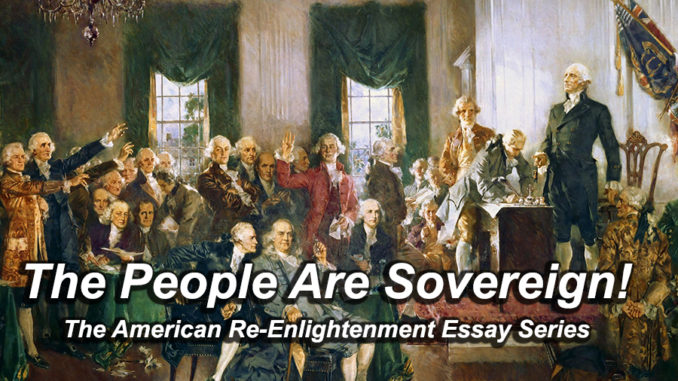
Part 1: What’s So Great About Our Constitution, Anyway?
Essay 4 – We Have Rights!
We sure hear a lot about rights, don’t we?
People often toss around their ideas of what is a right, what should be a right, what shouldn’t be a right, constitutional rights, human rights, civil rights, the Bill of Rights, privacy rights, marriage rights, and so forth.
It all kind of gets thrown into a blender together and gets all muddled up, which creates a vast amount of confusion and misunderstandings on what exactly your rights are as a citizen of the United States of America.
This essay will attempt to unravel the tangled web of the subject of rights.
Our country was founded on the principle of “natural rights” as Thomas Jefferson so eloquently stated in our Declaration of Independence:
“We hold these truths to be self-evident, that all men are created equal, that they are endowed by their Creator with certain unalienable Rights, that among these are Life, Liberty and the pursuit of Happiness. — That to secure these rights, Governments are instituted among Men, deriving their just powers from the consent of the governed…”
To understand the concept, I need to make some distinctions on different “rights” terminology in the way that I will be discussing them:
1. Natural Rights – these are rights that every human has upon birth, by nature. Some, as in the Declaration of Independence, claim them to come from God (Creator), some simply from “nature”, but no matter how it’s described or what your religion may or may not be, these rights are within and a part of being human. Examples of these rights are life, liberty, property, pursuit of happiness, self-defense, speech, religion, etc.
2. Civil Rights – these are rights that are provided through the form of government that is created from the social compact. Such rights would include citizenship, voting, equal treatment under the law, the right to an attorney if charged with a crime, etc.
3. Human Rights – the concept of human rights goes beyond the other types of rights in that some believe that everyone is entitled to objects and services needed for a comfortable life. For example, many believe that everyone has a human right to housing, food, a job, a “living wage”, health insurance, health care, etc.
By necessity, the Constitution does create some civil rights as described above. However, the overwhelming philosophy behind the Constitution and our form of government was based on our natural rights.
For the American Experiment, the idea was to offer the maximum amount of individual liberty possible. Basically, the concept is that you should be left alone to live your life as you see fit, as long as you do not infringe upon another individual’s natural rights.
Live and let live.
You are sovereign over yourself upon birth.
No person has the authority to rule over another person.
No person has the authority to tell you what to do, what to think, what to say, or what to believe.
You do you.
I know what you’re thinking…it sounds good, but, again, what about slavery? Of course slavery was a huge contradiction to this philosophy and that did not go unnoticed among the founders. We’ll discuss the issue of slavery and how the founders did (and did not) deal with it in another essay, but for the purpose of describing the idea of natural rights, please note that just because it was abhorrently not applied equally at the outset, does not mean that the idea itself is flawed.
Where we’ve gone wrong…
Most people confuse the different types of rights and don’t give too much thought about what it means.
For example, when someone claims that “health care is a right”, good people agree that it would be good for everyone to have good health care, so they mistakenly believe that it should, indeed, be “a right”. However, they don’t fully understand what that implies and the unintended consequences that would occur if we followed that rationale to it’s logical conclusion.
By taking the time to think a bit deeper about rights, we’ll better understand why what may sound good at first, may not be so good in the end and actually hurt the very people you are trying to help.
I’ll develop this thought and the topic of rights in the next essays.
About this series:
The People Are Sovereign! is a series of 30 essays that will be posted on a daily basis. The series will continue tomorrow with Essay 5 – Constitutional Rights?
To view the previous essay in the series, click this link: Essay 3 – We the People
To view the next essay in the series, click this link: Essay 5 – Constitutional Rights?

2 Trackbacks / Pingbacks
Comments are closed.